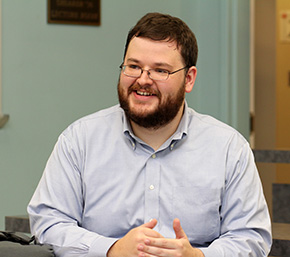David Peck ’22 entered Wabash College at 16, graduated Phi Beta Kappa at 19, completed Harvard Law School at 22, became the youngest presiding justice for Manhattan and the Bronx, and still found time to author two books and, in his later years, a TV screenplay.
No wonder the College’s Junior Peck Medal is given to the senior who possesses “promise in the law.”
With big shoes to fill, the 2012 recipient, Tim Markey, realizes he has yet to act on that promise.
“I haven’t actually done anything yet,” he said. “I haven’t been a lawyer. I want to be great at what I do, but I feel like I need to get out there and actually do it.”
Pre-law advisor and Visiting Associate Professor of Political Science Scott Himsel believes in his former pupil, noting that Markey is a deep thinker who is sensitive to the feelings of others.
“Tim is breathtakingly intelligent,” said Himsel ‘85. “There is nothing about Tim Markey that is ostentatious. He is the sort of person who his peers – even his competitors – both like and respect. He figures things out so fast, and he can do that without putting people off.”
 Realizing the importance of others, respecting them, and knowing what’s going on in their lives – networking intelligently and humanely – helped Markey become aware of an opportunity at Sullivan & Cromwell, the firm headquartered in New York City.
Realizing the importance of others, respecting them, and knowing what’s going on in their lives – networking intelligently and humanely – helped Markey become aware of an opportunity at Sullivan & Cromwell, the firm headquartered in New York City.
Markey met Gillian Seaman his first year of law school at the University of Chicago. The two became friends when they traded notes in a criminal law class and happened to be in the same writing section. Seaman was a summer associate at Sullivan & Cromwell following their second year at UChicago, a summer in which Markey worked in a state’s attorney’s office. When Seaman found out that the firm had an opening last fall, she put in some calls on his behalf and prodded Markey to apply.
“I’ve tried to surround myself with people who are more collegial and try to be that way myself,” Markey explained. “Part of it was luck. I happened to be in a great writing section, and my section was full of amazing people, but it’s a matter of how you treat people and finding the right ones to surround yourself with.”
Seaman sees that friendliness as a key to success, both now and in his blossoming career.
“There's a joke that all lawyers are sharks, but the reality is that those who know how to work well with others often do the best,” Seaman said. “Tim has always possessed a quiet confidence and a willingness to help others, and that makes him a wonderful team player.”
Markey’s confidence was forged at Wabash, as illustrated by a pair of writing assignments surrounding a landmark case, District of Columbia v. Heller, and what happened in between. When the case first arose in his freshman tutorial on the Supreme Court, admittedly, he was lost. In Himsel’s Constitutional Law class three years later, it was completely different.
“I felt so much more comfortable,” Markey said. “I was going through that case saying, ‘I get this now.’ I know how to analyze these arguments. I can read a case like a lawyer and understand what the arguments are and put them together.”
That freshman tutorial opened his eyes to the power of language. Reading the opinions of Oliver Wendell Holmes Jr., Markey marveled at how crafted, short, and powerful they were, which underscored how a lawyer could be more influential and effective with a strong command of language and sharp writing skills.
From there, he took a few English courses, including Professor Marc Hudson’s Shakespeare class which seemingly lit a fire within him. He fell in love with the written word, eventually majoring in English and studying medieval literature and architecture abroad at the University of York in England.
Hudson saw a student in love with language, but squarely, and happily, locked in on the law.
“The law was his focus, but that didn’t distract him from his love of literature,” said Hudson. “I think he’s more interested in teasing out the truth or falsehood of a proposition than he is about winning or losing an argument.”
Perhaps it is Markey’s zest or his compassion that makes him an unusual combination in the cutthroat world of the law. To this point, such differences have Markey positioned well – “it feels like hitting the lottery,” he says – with a dream job awaiting in the Big Apple.
While Markey is slated to finish law school on June 13, the connections between Judge Peck and Markey will only grow stronger, as he enters the very department in the same firm that Peck so indelibly impacted, as partner and council at Sullivan & Cromwell for 30 years.
Those ties strengthened when Markey interviewed with Sullivan & Cromwell, first sitting down with Rick Pepperman, Co-Managing Partner of the firm’s Litigation Group. Pepperman has Peck’s old job, and the link served as a starting point for a fine interview.
“The Peck Medal came up a lot in interviews, but Rick was the one person who knew who Judge Peck was. We were able to talk about Judge Peck and his legacy on the bench,” concluded Markey. “That was actually the best interview I remember having at any law firm I went to. I might have Judge Peck to thank for that.”